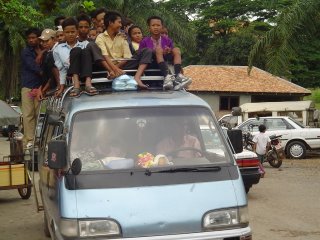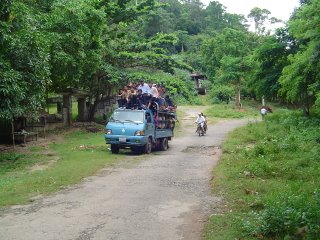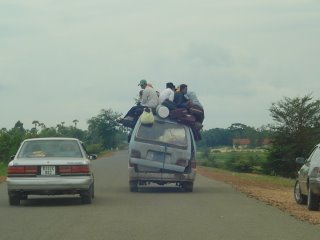
A number of articles in the Cambodian Daily over the past few days have focused on safety. In today’s (September 25, 2006) Letter to the Editor, a reader complains about ferry safety: he points out that ferries lack safety devices such as lifejackets and/or life buoys. How important this is, was illustrated by an incident off the coast last week when a local boat sank and seven people drowned despite being just 100m off-land.
Other modes of public transport are often not in better shape. Buses do not tend to be safety first vehicles; using Cambodian roads are dangerous enough without emphasizing Cambodian roads fair share of inexperienced and carefree drivers combined with the fact that many vehicles (incl. buses) have the steering wheel on the wrong side and lack maintenance and the poor condition of the roads themselves. In a recent blog posting (24 September 2006) the author describes how the bus he was traveling broke its axle just a minute after leaving. Crossing Cambodia has also reported other accidents involving buses.
The next step down in the public transport are minivans which, oddly enough, provide long haul travel. They are often over packed (see photo’s elsewhere):passengers up front and on top; freight in the back or on top. Last week Thursday’s Cambodian Daily (21 September 2006) reported an incident in one of the western provinces where one passenger died and various injured when their mini van hit an overhead pole. They had been ‘seated’ on top of the van.
For local transport there is the ‘remorque’ : a motorcycle with a big trailer behind. Remorque is French for to tow. This type of vehicle must be very Cambodian, there is definitely no Wiki page available on this. What’s more, if the draft version of the traffic law is accepted the remorque will probably cease to exist. The towed trailer is a bit deep and loose planks are laid from side to side which are meant as the seats. Often these are over loaded, 20-30 passengers is no problem. A major safety issue is that the trailer can easily cause the motorcycle front wheel to make a wheelie and thus steeringless. Luckything is that these motorcycles can’t drive fast.
Further down the list of public travel options are long/short haul taxi’s which are packed toi the brim (4 peopleon the two front seats). Last week I saw one with two persons in baggage boot. The boot lid was up and each sat on a side of the car holding the lid.
What they have in common is that they are all highly dangerous vehicles.
But having your own vehicle is not always a guanrantee for safety. In the police blotter from the Phnom Penh Post (Sept 21- October 5), 4 of the 17 articles mention motocycles being stolen at gun-point/knife point! Three of the four cases the victim was shot or stabbed, the other case one of the robbers was shot by a ‘anonymous’ who then stole the robbers’ motorcycle!
Today’s blog seems to be loosing the point. The Cambodian Daily again of 25 September 2006 reports less accidents during the past Pchum Ben holidays. Six dead. The article goes on then that the decrease is due to police vigilance: ‘we do not allow taxis to be overloaded’ at least in Kampong Cham. Crossing Cambodia’s observation seemed quite contradictory to that statement, but the experience related to different provinces. But is safety a real issue?
Crossing Cambodia has been trying to is to put what’s happening on Cambodian roads into perspective. In May 2006 a meeting was held in Bangkok, hosted by the UNESCAP(United Nations Economic and Social Commission for Asia and the Pacific) Secretariat. A ‘Status of Road Safety in Asia‘ was presented. One highlight of the report was the actual lack of details/data. Apparently in most Asian countries data on safety issues are deemed not important. In spite of this I have tried to give an overview of the Cambodian situation vis-à-vis its (selected) neighbors. In the overview Crossing Cambodia shows that Cambodia has relatively fewer vehicles but that the fatality rate is high and its effect to the economy is much higher than those of other countries, actually in that last comparison, Cambodia is the most affected country in Asia! Some doubt exist over the data though: in some countries the number of fatalities are higher than those injured!
Safety issues:
|
|
|
|
|
|
|
|
|
|
|
| GNI (US$) | Vehicles per
1000 inhabitants | % 2/3 wheelers
(of total) | Fatalities | Fatalities per
10,000 vehicles | Injuries | Estimated loss to GDP |
|
| Cambodia | 350 | 33 | 75.2 | 824 | 16 | 6329 | 3.2% |
|
| Lao PDR | 400 | 47 | 80.1 | 426 | 17 | 6699 | 2.7% |
|
| Vietnam | 540 | 148 | 94.4 | 20400 | 7 | 13186 | 2.5% |
|
| Thailand | 2490 | 391 | 70.9 | 13116 | 0.6 | 69313 | 2.1% |
|
| Nepal | 250 | 13 | 65.4 | 1987 | 42 | 4390 |
|
|
| Bangladesh | 440 | 19 | 66.6 | 3150 | 103 | 3026 |
|
|
|
|
|
|
|
|
|
|
|
|
But clearly the scope for improvement is needed, most incidents occurring needn’t. Even with new laws the drop may not occur. Firstly there is the case that police enforcement is unsure, secondly the number of vehicles being registered is growing very fast so even new law and enforcement would only result in a smaller growth of unsafetiness.









